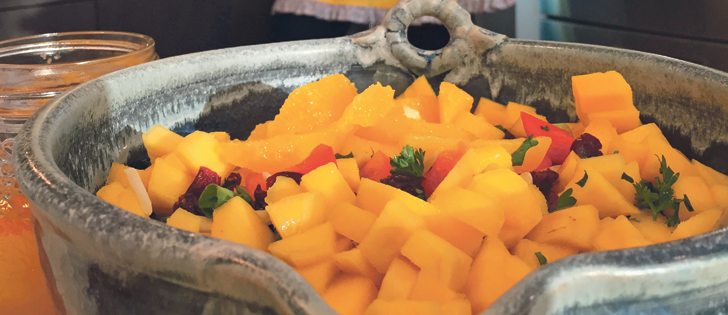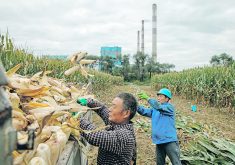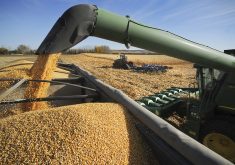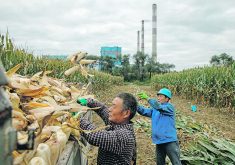Producer group aims to provide credible information on healthy meals and farm practices through consumer workshops
Consumers have become frazzled about food, whether it’s over GMOs, pesticides, gluten, big farms versus small farms, local versus global or organic versus conventional.
Jennifer Dyck and Ellen Pruden are trying to alleviate the worry by challenging today’s food paranoia with a simple and friendly method.
“I think it’s really about putting people back in their kitchen and cooking with whole ingredients,” said Dyck, a professional home economist, as she stood wearing an apron behind a kitchen table loaded with freshly chopped salad ingredients.
Read Also

Farming Smarter receives financial boost from Alberta government for potato research
Farming Smarter near Lethbridge got a boost to its research equipment, thanks to the Alberta government’s increase in funding for research associations.
“Let’s love our food again.”
Pruden has the same view on how to mellow out some of the heated up arguments about food that have upset millions of consumers and made them unsure of what to eat.
“Going back into the kitchen, cooking with whole ingredients, eating at the table with your family, reducing food waste, building a relationship with farmers: that’s where we’re going to move forward,” said Pruden.
The two work for the Canola Eat Well initiative, which is a farmer-funded program that holds workshops and other events in many parts of Canada, highlighting the healthy, nutritious meals that people can make at home, that cooks can make in professional kitchens and that dieticians and other professional consumer nutrition advisers can promote to their clients.
Related stories in this issue:
- Farm groups challenge food company’s non-GM pledge
- Consumers searchfor trustworthy GMO information
- Grappling with GM animals
- Case made for labelling, but questions abound
- Public’s anti-GMO perception tainted by media, say Green Party, NFU
- Judge GM on a case-by-case basis: experts
- The debate over GM foods
- Farmers play important role in building consumer trust
- Consumers still opposed to GM food
- Divergence: If GM technology is safe, why don’t consumers trust it?
Canola Eat Well holds numerous events on the Prairies, mostly in the major cities, but it also holds about six events a year in Toronto at the heart of Canada’s consumer, restaurant and media markets.
Its events take a number of forms, but almost always include live cooking, lots of discussion and a chance for urban residents and professional food people to meet with a real, live farmer. They give people a chance to think about food in a positive light, which is a tonic against today’s climate of fear, but also provides something many urban foodies truly desire: contact with a farmer.
“They truly want to connect with the farmer, but they just don’t know what the language is,” said Pruden.
More than just in-person events, the campaign also reaches out to consumers and food people through various forms of social media, from Facebook Live to Twitter to Instagram, all of which allow it to build a community of people who care about healthy food. As always, becoming connected with real farmers is popular with urbanites.
“How many people know a farmer? You don’t (usually),” Pruden said about urban residents.
“But we now live in a digital age where you can know a farmer that lives in Binscarth, Man., or some place in Alberta, and you have that ability to engage with them online.”
Canola Eat Well was born in Manitoba within the Manitoba Canola Growers Association but has picked up support from Alberta and Sask-atchewan canola growers and includes canola oil in most of its cooking and the recipes it promotes.
However, it isn’t just a shill for canola oil. It operates under the premise that encouraging consumers to enjoy eating and preparing food and using whole and wholesome ingredients will help farmers more than pushing any component or approach to food or farming.
On this mid-December day, with sunlight bathing her kitchen, Dyck showed how to make a mango-quinoa salad as a demonstration of how Canola Eat Well encourages positive feelings about food.
It contained those two items, plus pomegranate, canola oil, cucumber, red pepper, spices and other ingredients. Some came from Canada, such as the cucumber and the canola oil. Some definitely did not, such as the mango and pomegranate. And some might have, such as the red pepper and quinoa, both of which are generally imported but are also now produced domestically as well.
Many people seldom prepare meals from scratch, which can make the kitchen an intimidating place when combined with food fears.
“It’s less scary when you get to actually touch something and look at it, ask some questions and do that hands-on part,” she said. “It just becomes a part of what you do.”
Consumers who participate in Canola Eat Well events, either in person or through social media, have the opportunity to talk about anything food-related.
Questions sometimes come up about tempestuous issues such as GMOs, pesticides and gluten, but Dyck said the events do not descend into arguments that drive people into ideological corners because the goal is not to defend approved products and systems.
Consumers, foodies and food professionals are told where they can find credible information on these issues, and Dyck and Pruden said they don’t feel like they have to defend against misperceptions or accusations.
“There’s no point arguing on Facebook,” said Pruden.
Added Dyck: “I feel like I’m past the … ’is the GMO safe?’ conversation.… I’m beyond that.”
Online trolls sometime target what they are doing, but they don’t tend to derail anything. Trolls bring responses from others, and the Canola Eat Well people can get back to talking about preparing food, enjoying food and bringing joy back into the kitchen.
“Everybody’s intimidated on what to buy. Everybody’s scared of their food,” said Dyck. “Stop being scared of your food. We have one of the safest, most abundant variety and selection of affordable food … in the world. It’s just helping people be confident in their food choices and know they can be confident in the grocery store.”


















